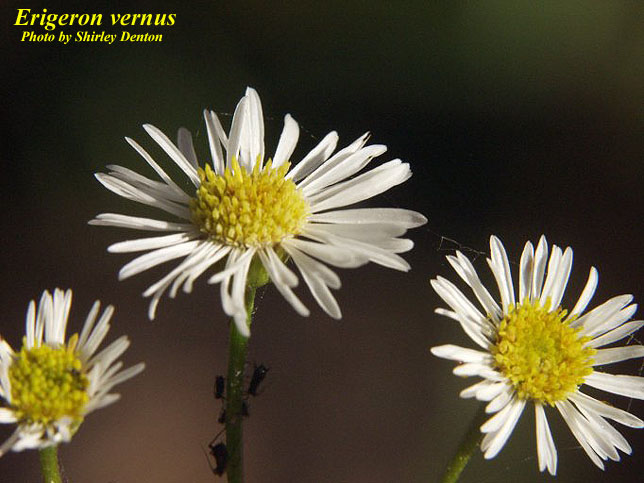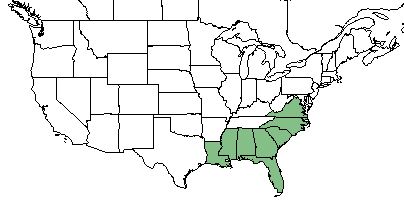Difference between revisions of "Erigeron vernus"
(→Ecology) |
(→Ecology) |
||
| Line 40: | Line 40: | ||
<!--===Pollination===--> | <!--===Pollination===--> | ||
===Use by animals=== <!--Herbivory, granivory, insect hosting, etc.--> | ===Use by animals=== <!--Herbivory, granivory, insect hosting, etc.--> | ||
| − | ''E. vernus'' has poor forage value. <ref name= "Hilmon, J. B. (1964). "Plants of the Caloosa Experimental Range " U.S. Forest Service Research Paper SE-12 </ref> | + | ''E. vernus'' has poor forage value. <ref name= "Hilmon 1964"> Hilmon, J. B. (1964). "Plants of the Caloosa Experimental Range " U.S. Forest Service Research Paper SE-12 </ref> |
<!--==Diseases and parasites==--> | <!--==Diseases and parasites==--> | ||
Revision as of 13:57, 13 June 2018
Common name: early whitetop fleabane [1], whitetop fleabane [2]
| Erigeron vernus | |
|---|---|

| |
| Photo by the Atlas of Florida Plants Database | |
| Scientific classification | |
| Kingdom: | Plantae |
| Division: | Magnoliophyta - Flowering plants |
| Class: | Magnoliopsida - Dicots |
| Order: | Asterales |
| Family: | Asteraceae |
| Genus: | Erigeron |
| Species: | E. vernus |
| Binomial name | |
| Erigeron vernus L | |

| |
| Natural range of Erigeron vernus from USDA NRCS Plants Database. | |
Contents
Taxonomic Notes
Synonyms: none
Varieties: none
Description
E. vernus is a perennial forb/herb of the Asteraceae family native to North America. [1]
Distribution
E. vernus is found along the southeastern coast of the United States from Louisiana to Virginia. [1]
Ecology
Habitat
E. vernus proliferates in wet savannas, seepages, and interdunal swales. [2]
Phenology
E. vernus flowers January-July and September. [3]
Use by animals
E. vernus has poor forage value. [4]
Conservation and Management
Cultivation and restoration
Photo Gallery
References and notes
- ↑ 1.0 1.1 1.2 USDA Plant Database https://plants.usda.gov/core/profile?symbol=ERVE
- ↑ 2.0 2.1 Weakley, A. S. (2015). Flora of the Southern and Mid-Atlantic States. Chapel Hill, NC, University of North Carolina Herbarium.
- ↑ PanFlora Author: Gil Nelson URL: http://www.gilnelson.com/PanFlora/ Date Accessed: 5/21/18
- ↑ Hilmon, J. B. (1964). "Plants of the Caloosa Experimental Range " U.S. Forest Service Research Paper SE-12